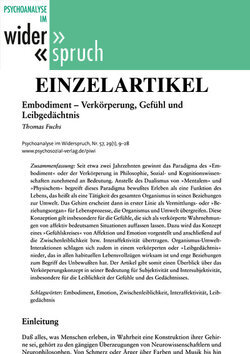20 Seiten, PDF-E-Book
Erschienen: Juli 2017
Bestell-Nr.: 22533
https://doi.org/10.30820/0941-5378-2017-1-9
abonnieren
Thomas Fuchs
Embodiment - Verkörperung, Gefühl und Leibgedächtnis (PDF)
Sofortdownload
Dies ist ein E-Book. Unsere E-Books sind mit einem personalisierten Wasserzeichen versehen,
jedoch frei von weiteren technischen Schutzmaßnahmen (»DRM«).
Erfahren Sie hier mehr zu den Datei-Formaten.
Seit etwa zwei Jahrzehnten gewinnt das Paradigma des »Embodiment« oder der Verkörperung in Philosophie, Sozialund Kognitionswissenschaften zunehmend an Bedeutung. Anstelle des Dualismus von »Mentalem« und »Physischem« begreift dieses Paradigma bewußtes Erleben als eine Funktion des Lebens, das heißt als eine Tätigkeit des gesamten Organismus in seinen Beziehungen zur Umwelt. Das Gehirn erscheint dann in erster Linie als Vermittlungsoder »Beziehungsorgan« für Lebensprozesse, die Organismus und Umwelt übergreifen. Diese Konzeption gilt insbesondere für die Gefühle, die sich als verkörperte Wahrnehmungen von affektiv bedeutsamen Situationen auffassen lassen. Dazu wird das Konzept eines »Gefühlskreises« von Affektion und Emotion vorgestellt und anschließend auf die Zwischenleiblichkeit bzw. Interaffektivität übertragen. Organismus-Umwelt-Interaktionen schlagen sich zudem in einem verkörperten oder »Leibgedächtnis« nieder, das in allen habituellen Lebensvollzügen wirksam ist und enge Beziehungen zum Begriff des Unbewußten hat. Der Artikel gibt somit einen Überblick über das Verkörperungskonzept in seiner Bedeutung für Subjektivität und Intersubjektivität, insbesondere für die Leiblichkeit der Gefühle und des Gedächtnisses.
Abstract:
Since two decades, the paradigm of embodiment has gained increasing importance within philosophy and the social and cognitive sciences. Instead of the traditional dualism of the mental and the physical, this paradigm regards conscious experience as a function of life, that means, as an activity of the whole organism in its relation to the environment. From this point of view, the brain should be conceived as a »relational organ« mediating the life processes that encompass organism and environment. This concept applies in particular for emotions which may be regarded as embodied perceptions of relevant situations and their affective qualities. To this purpose, the concept of an »affective cycle« is proposed, consisting of both »affection« and »emotion«, which is then applied to the sphere of intercorporeality or interaffectivity. Moreover, the interactions between organism and environment are sedimented over time in an implicit or bodily memory that is effective in all habitual enactments of life and closely related to the unconscious. In sum, the paper gives an overview on the concept of embodiment and its relevance for subjective and intersubjective experience, in particular for the embodied nature of emotions and memory.
Abstract:
Since two decades, the paradigm of embodiment has gained increasing importance within philosophy and the social and cognitive sciences. Instead of the traditional dualism of the mental and the physical, this paradigm regards conscious experience as a function of life, that means, as an activity of the whole organism in its relation to the environment. From this point of view, the brain should be conceived as a »relational organ« mediating the life processes that encompass organism and environment. This concept applies in particular for emotions which may be regarded as embodied perceptions of relevant situations and their affective qualities. To this purpose, the concept of an »affective cycle« is proposed, consisting of both »affection« and »emotion«, which is then applied to the sphere of intercorporeality or interaffectivity. Moreover, the interactions between organism and environment are sedimented over time in an implicit or bodily memory that is effective in all habitual enactments of life and closely related to the unconscious. In sum, the paper gives an overview on the concept of embodiment and its relevance for subjective and intersubjective experience, in particular for the embodied nature of emotions and memory.
Parfen LaszigS. 5–7Editorial (PDF)
Thomas FuchsS. 9–28Embodiment - Verkörperung, Gefühl und Leibgedächtnis (PDF)
Elisabeth RohrS. 29–41Ambivalenzen des Fremden (PDF)
Sozialpsychologische VerstehensversucheChrista HackS. 43–62Liebe in Zeiten von schwerer Krankheit und Sterben (PDF)
Gedanken zu den besonderen Herausforderungen und Chancen in Paarbeziehungen und in der therapeutischen Beziehung entlang klinischer BeobachtungenDetlev Achhammer & Gisela Krauß S. 63–73Das Verfahren vor der Schiedskommission am Beispiel der Schiedskommission der DGPT (PDF)
Angelika GilliardS. 75–89Grenzverletzungen in der Geschichte der Psychoanalyse (PDF)
Andreas JackeS. 91–99Batman beschützt New York (PDF)
Bruno ThebaldiS. 101–110Hinschauen oder wegschauen? (PDF)
Traumatologische Aspekte des Films Die Frau, die singtHeike Peters & Andreas Renzel S. 111–127Die Kinder und Jugendfilme Ostwind 1 und Ostwind 2 (PDF)
Ein märchenhafter, kraftvoller, weiblicher Aufbruch in die AdoleszenzHans BeckerS. 129–134Rechtsextremismus im Primärprozess als Massenbewegung (PDF)
Helmut DäukerS. 135–142»Der Schoß ist fruchtbar noch, aus dem das kroch« (B. Brecht) (PDF)
Ludwig JanusS. 143–148Rezension von: Freud, S. & Bullitt, W. (2007). Thomas Woodrow Wilson (PDF)
Thomas FuchsS. 9–28Embodiment - Verkörperung, Gefühl und Leibgedächtnis (PDF)
Elisabeth RohrS. 29–41Ambivalenzen des Fremden (PDF)
Sozialpsychologische VerstehensversucheChrista HackS. 43–62Liebe in Zeiten von schwerer Krankheit und Sterben (PDF)
Gedanken zu den besonderen Herausforderungen und Chancen in Paarbeziehungen und in der therapeutischen Beziehung entlang klinischer BeobachtungenDetlev Achhammer & Gisela Krauß S. 63–73Das Verfahren vor der Schiedskommission am Beispiel der Schiedskommission der DGPT (PDF)
Angelika GilliardS. 75–89Grenzverletzungen in der Geschichte der Psychoanalyse (PDF)
Andreas JackeS. 91–99Batman beschützt New York (PDF)
Bruno ThebaldiS. 101–110Hinschauen oder wegschauen? (PDF)
Traumatologische Aspekte des Films Die Frau, die singtHeike Peters & Andreas Renzel S. 111–127Die Kinder und Jugendfilme Ostwind 1 und Ostwind 2 (PDF)
Ein märchenhafter, kraftvoller, weiblicher Aufbruch in die AdoleszenzHans BeckerS. 129–134Rechtsextremismus im Primärprozess als Massenbewegung (PDF)
Helmut DäukerS. 135–142»Der Schoß ist fruchtbar noch, aus dem das kroch« (B. Brecht) (PDF)
Ludwig JanusS. 143–148Rezension von: Freud, S. & Bullitt, W. (2007). Thomas Woodrow Wilson (PDF)

